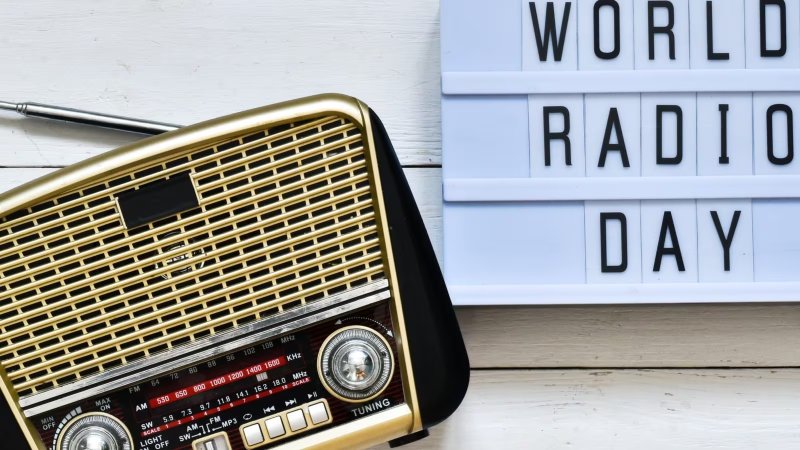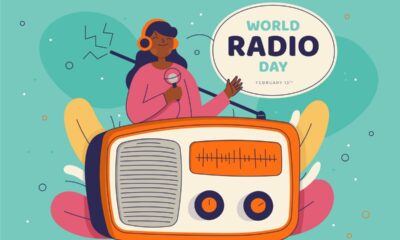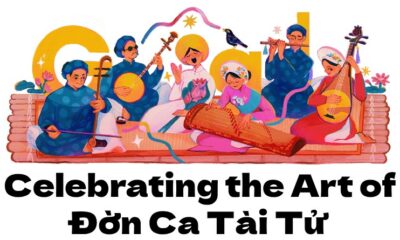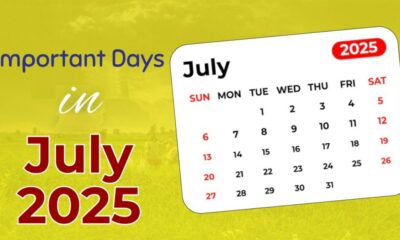Festivals & Events
World Radio Day 2024: History, Significance, Theme, and Ideas To Celebrate the Day by UNESCO

World Radio Day honors the potent medium that has endured for more than a century and is observed on February 13 every year. Following its proclamation by UNESCO member states in 2011, this day was adopted by the UN General Assembly in 2012.
Radio is a widely used source of communication that is available in far-flung places around the world. In honor of its use, which unites people worldwide despite differences in knowledge, demographic, and geographic limitations, this day is set aside to celebrate technology.
For more than a century, radio has provided a forum for public intervention in matters of public concern. Its low cost makes it especially suitable for reaching remote communities and marginalized individuals. Additionally, radio remains an essential tool for disaster relief and emergency communication, regardless of an individual’s educational attainment. The United Nations Educational, Scientific, and Cultural Organization (UNESCO) states that radio has reached its 100th anniversary. As such, it is an important occasion to celebrate the medium’s many virtues and ongoing potency, especially in light of the challenges it faces from digital platforms, social media, censorship, consolidations, generational and digital divides, and declining audience and revenue.
World Radio Day 2024: Date
Every year on February 13, 2024, people celebrate World Radio Day.
World Radio Day 2024: History
Most people agree that Guglielmo Marconi broadcast the first radio message in 1895. More widely distributed radio broadcasts featuring music and discussions began to appear, albeit in an experimental manner, sometime between 1905 and 1906.
Early in the 1920s saw the commercial introduction of radio. Nearly three decades passed before radio stations were established, and by the 1950s, radio and broadcasting systems were widely used around the world.
In 2011, Member States of UNESCO declared February 13 to be World Radio Day, marking a gap of nearly 60 years. In 2013, the UN General Assembly declared it to be an international event.
According to the UN, radio can “shape a society’s experience of diversity, stand as an arena for all voices to speak out, be represented and heard.” It is one of the most widely consumed media worldwide.
Based on a consultation process conducted by UNESCO in 2011, the Executive Board of UNESCO recommended to the General Conference the proclamation of World Radio Day, following a proposal from Spain. On February 13, 1946, the then-UNESCO Director-General proposed the creation of United Nations Radio, and on the same day, at its 36th session, UNESCO declared February 13 to be World Radio Day.
On January 14, 2013, the UN General Assembly formally approved UNESCO’s declaration of World Radio Day. The UN established a resolution designating February 13 as World Radio Day during its 67th session.
World Radio Day 2024: Significance
The United Nations states that the goal of World Radio Day is to increase public and media awareness of the value of radio.
The day also seeks to promote networking and cross-border cooperation among broadcasters, as well as to encourage radio stations to make information accessible through their medium.
World Radio Day 2024: Theme
“Radio: A century informing, entertaining, and educating” is the theme for World Radio Day, which is observed on February 13, 2024. “The 2024 observance highlights the history of radio and its powerful impact on news, drama, music, and sports. It also recognises the ongoing practical value as a portable public safety net during emergencies and power outages, caused by natural and human-made disasters, such as storms, earthquakes, floods, heat, wildfires, accidents, and warfare. Furthermore, the continuing democratic value of Radio radio is to serve as a grassroots catalyst for connectedness within underserved groups, including immigrant, religious, minority, and poverty-stricken populations.”
How To Celebrate World Radio Day 2024?
The 20 pre-recorded 60-second audio clips from World Radio Day’s first 100 years of service to humanity are called World Radio Day Minutes. You may play these audios as non-commercial announcements on this day.
Take part in live or pre-produced talk shows honoring radio to learn more about the value of radio. People can interact with former radio hosts and listen to air segments where they share their experiences.
UNESCO has released 13 ideas for celebrating World Radio Day 2024.
World Radio Day 2024 Live Event: Plan a panel discussion and audience attendance for an indoor or outdoor event on this day. In addition to a local business sponsor, a nearby university or college can serve as an excellent location to attract younger customers.
Sponsorship with Local Consumer Electronics: Set up a sales promotion agreement with a nearby supplier of radio equipment to offer new-age radio devices at a special discount on this particular day.
‘Radio Songs’ That Are The Best Ever: Make a playlist of the greatest songs ever recorded, either worldwide or unique to your area, and play it for listeners to relive the magic of old times.
International Dialogue: Arrange a podcast for listeners by getting in touch with international radio experts.
Visit a Radio Station: To make this a special day for music lovers, arrange for students or those who are interested to visit radio stations.
Theatre of the Mind: To make World Radio Day extra special for music lovers, play locally produced songs and dramas on the radio. Sports, thought-provoking conversations, and cultural expressions are further options.
Radio and Emergencies: Remind people of the times when radio served as the only source of information in the absence of electricity. With the help of this gadget, people could learn about their surroundings and never worry about running out of battery power.
The First Interactive Mass Media, Radio: When referring to radio, use phrases like “the original social media” or “the original interactive mass medium.” The first medium to go live was radio, and it still does.
Podcasts: Provide listeners with live or pre-recorded talks or timeless podcasts. Use radio to remind them of a bygone era when life was different. There were times when listening to your favorite radio host or radio channel seemed like a luxury, and Spotify and YouTube were not even an option.
Take Me to the Stadium: On World Radio Day, remind listeners of the times they kept their radios close to following the latest scores of their favorite matches rather than watching a live match.
Pride and Hope: We are proud of the advancements radio has made throughout the years, and today marks that progress. Additionally, the radio stream now has access to new audiences through new avenues.
-

 Sports4 weeks ago
Sports4 weeks agoFIFA Club World Cup 2025: Complete List of Qualified Teams and Groups
-

 Sports3 weeks ago
Sports3 weeks agoAl Ahly vs Inter Miami, 2025 FIFA Club World Cup – Preview, Prediction, Predicted Lineups and How to Watch
-
Health1 week ago
Back to Roots: Ayurveda Offers Natural Cure for Common Hair Woes
-

 Tech2 weeks ago
Tech2 weeks agoFrom Soil to Silicon: The Rise of Agriculture AI and Drone Innovations in 2025
-

 Sports3 weeks ago
Sports3 weeks agoFIVB Men’s Volleyball Nations League 2025: Full Schedule, Fixtures, Format, Teams, Pools and How to Watch
-

 Startup3 weeks ago
Startup3 weeks agoHow Instagram Is Driving Global Social Media Marketing Trends
-

 Television4 weeks ago
Television4 weeks agoTribeca Festival 2025: Date, Time, Lineups, Performances, Tickets and How to Watch
-

 Sports3 weeks ago
Sports3 weeks agoWorld Judo Championships 2025: Full Schedule, Date, Time, Key Athletes and How to Watch























